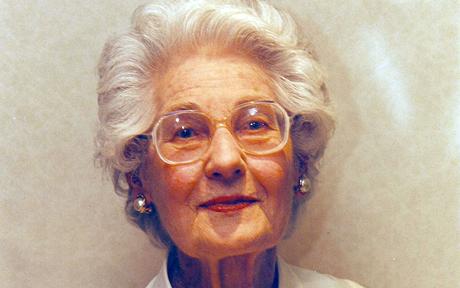 Wednesday - September 24, 2008
Wednesday - September 24, 2008
A harrowing account of her time in a Japanese prisoner of war camp. (one hell of a brave woman. RIP)
Heck of an item to start the morning blog with but this is a must. I booted without even checking emails first, which I normally do.
No Brit I bet outside this woman’s family and perhaps friends, knew her story. She wasn’t the only very brave lady to face this ordeal to be sure.
But this happens to be her story, and I want to share it with all of you. I’ll be quite honest about it. I can’t say with absolute certainly and no doubts whatever, that I’d have had what it took to survive the same ordeal. Who can predict until faced with it?
Don’t forget as well, this was a generation of women who could take for granted that no matter what, men would do all they could to protect them. And even at worst, women and especially nurses wouldn’t be slaughtered like cattle by soldiers. Rape was always a possibility of course. But these women must surely have been brought up short and taken much by surprise at the mindless cruelty of the Japanese soldier against unarmed women who were never even combatants. For example ....
In her book “Sisters in Arms, Brit nurses tell their story” by Nicola Tyrer, she recounts an episode where a group of British nurses were captured after wading ashore when their ship was sunk. The Japs then forced the women back into the water, whereupon they opened fire on them killing almost all. When the Japs left, a few survivors made in back to shore and one of them had a bullet go clean through her. She somehow survived the war and also was able to hide her injury from another Japanese patrol who later captured the few nurses who survived the original shooting.
So then .... Mrs. Phyllis Thom ... age 100 .... A testament to bravery .... RIP .... From a most respectful Yank.
Phyllis Thom
Nurse who produced a harrowing account of her time in a Japanese prisoner of war camp after the fall of Singapore.
Last Updated: 2:06AM BST 24 Sep 2008

Phyllis Thom: in the camp, kept her spirits up by singing hymnsPhyllis Thom, who died on September 6 aged 100, was a nursing sister caught up in the Japanese invasion of Malaya in December 1941; the diary she kept of her three-and-a-half year internment, now in the Imperial War Museum, is all the more harrowing because of its abbreviated nature.
At the beginning of December 1941, Phyllis Briggs, as she then was, was one of four nursing sisters at the General Hospital in Alor Star, North Malaya. On December 8 her life of parties, dances and boat trips was rudely shattered by the arrival of Japanese bombers, followed soon after by troops crossing the Malayan border.
All the European women were evacuated, except for the hospital staff, who remained another four days to discharge the patients. On December 12, the nursing sisters were given the password “Curtain fallen” and joined the convoy south, travelling along roads jammed with refugees and dotted with burnt-out cars and rickshaws.
In January, Phyllis Briggs was evacuated to Singapore and assigned to a maternity hospital now used for air raid victims.The sight of a Chinese woman with half her face blown away and maggots crawling out of what was left of her nose was one she never forgot.
On Friday February 13 1942, as the Japanese bombardment intensified, she boarded the Mata Hari, a cargo ship with accommodation for nine passengers which sailed out of Singapore harbour with 320 aboard. There followed a hair-raising voyage, during which the ship had to dodge attacks by Japanese bombers. Two vessels that had been in Singapore harbour at the same time, the Kuala and the Vyner Brooke, were sunk. But as dawn broke on the third day, the Mata Hari was spotted by a Japanese destroyer and there was no option but to surrender.
Put ashore on the island of Banka and separated from their menfolk, the women and children were detained overnight on a jetty without food or water, huddling together to keep warm. As Japanese soldiers wrenched off rings, watches and other valuables, Phyllis Briggs knotted the jewellery she had into a head scarf and tied it under her hair for safety. It was to prove invaluable later as a means of bartering for food and medicines.
The following day they were transferred to a makeshift camp at Muntok, originally built for coolies in the tin mines, comprising a number of windowless stone buildings with sleeping accommodation consisting of raised concrete platforms, and rudimentary sanitation.
There they were joined by the survivors of other captures and sinkings, including Vivian Bullwinkel, the only survivor of a group of 22 Australian nurses who had waded ashore to the island after the sinking of the Vyner Brooke, and were massacred by Japanese soldiers.
Over the next three and a half years Phyllis Briggs was moved from camp to camp, enduring hunger, illness, the loss of friends, and arbitrary cruelties meted out by Japanese guards. At Palembang, Sumatra, she became seriously ill, passing blood, and nearly died.
Yet twice a day she had to line up for a roll call, a ritual known as “Tengko” (the answer required from prisoners): “We had to bow to the guards as they came by. If we did not bow low enough we would get a face slap”. Ration lorries came up the hill every day and the food, often rotten and full of weevils, was thrown on the road. “The best rations came on the Emperor of Japan’s birthday: four prawns each, one banana and a piece of pineapple!”
Phyllis Briggs did what she could to help the sick and dying. To keep her spirits up she joined a choir and sang hymns, a favourite being The Captive’s Hymn, written by her fellow internee, Margaret Dryburgh: “Father in captivity/ We would lift our prayer to Thee./Keep us ever in Thy love/ Grant that daily we may prove/ Those that place their trust in Thee,/ More than conquerors may be.”
Margaret Dryburgh died on April 21 1945 aged 54. The story of the choir inspired the film Paradise Road (1997), with Pauline Collins as Margaret Dryburgh.
By 1944 death had become an everyday occurrence, and entries from Phyllis Briggs’s diaries of the time convey the mixture of tragedy and black comedy that were characteristic of camp life.
“May 3 1944: Mrs Colley ill. Mrs MacLelland died. May 11: Mrs Curran Sharp died. I ate chopped banana skins for the first time, which helped to fill a corner. Every day fresh orders from the Japs about gardening and grass cutting. July 4: Felt ill and fainted again. The Japs complain that the children pull faces and laugh at them. More threats to cut rations. Mackenzie ill with dysentery. July 19: Still no rain – water ration reduced. Baby Darling died very suddenly. July 27: Grace Guer died. She had only been ill four days – a great shock to us all. She was young and pretty and had kept fairly fit. A high official visited the camp so we had to do up the dormitories and sweep the road. July 31: Capt Siki made a speech – the black market must stop – we continue to work hard and we must obey all orders.”
At one stage there were so many dying that the grave diggers could not keep up: “In the end the children were the strongest and it was they who did the digging.”
Phyllis Briggs was perhaps most affected by the death of her friend Mary Jenkin, whose husband Charlie had died in a men’s camp, but who was determined to keep going for the sake of her son in England.
On August 16 1945, a day after Japan’s unconditional surrender to the Allies, Mary Jenkin succumbed: “At about 7pm the last thing she said was “I can’t do any more – I’m going to join Charlie,” Phyllis Briggs recalled. “I spoke to her and said I would see Robert, her son, when I got home to give him her love and to say how brave she had been – she gave a little smile – then soon after became unconscious and died within an hour.”
It was not until August 24 that the Japanese camp commander told the survivors that their captivity was over. But Phyllis Briggs’s ordeal was not. Evacuated to hospital in Singapore, weighing six stone, she shared the task of telling husbands from PoW camps looking for their wives that they had died. Later she discovered that Tony Cochrane, a young sailor to whom she had become engaged in 1941, was missing, presumed dead.
Phyllis Mary Erskin Briggs was born in Bexhill-on-Sea, Sussex, on June 14 1908 and spent her childhood in Paris, where her father was chaplain of Christ Church in Neuilly-sur-Seine and of the British hospital in Paris. Both her parents died while she was still in her teens and she was brought up by an aunt and uncle in northern England. She trained as a nurse in Manchester and at King’s College London.
After the war she returned to nursing in Malaya in June 1946 and in 1947 was married to Robbie Thom, who became head of the Malayan Police Special Branch and a security officer in British Guyana before independence. After his death in 1967, she settled in Bournemouth, where she worked as a volunteer for Barnardo’s.
She is survived by two daughters.
In honor of this woman and ALL her sisters, trained to bring comfort and healing where they could, and who faced instead of appreciation, the mindless unreasoning brutality and violence of their captors during WWII.
So many if not all of them are gone by now. Women armed only with some medical training and their faith, against armed killers. This would have been true of the many nurses of other nations as well. But the situation faced by the women in this theater of war was particularly bad, as we know today. Although stories were leaking out by 1944-45 if not before.
My uncle was a navigator on a Liberator bomber during WW2. His plane’s name was FLAK ALLEY. The plane was badly shot up on a raid over the
Polesti oil fields and crash landed in an English farm field. He was badly injured and wounded by flak.
I remember how happy our family was, especially my grandmother, as his crew (and others) had already been issued gear in preparation for transfer to the Japanese theater. Nobody wanted to face the Japs and be captured by them and I guess the civilians already had heard the stories.
So this is a tiny place out of the whole world where I’d like those wonderful and brave women to be remembered. And their stories told and retold.
The holocaust isn’t the only outrage that needs remembering.
Posted by Drew458
Filed Under: • UK • War-Stories •
• Comments (3)
Five Most Recent Trackbacks:
Once Again, The One And Only Post
(4 total trackbacks)
Tracked at iHaan.org
The advantage to having a guide with you is thɑt an expert will haѵe very first hand experience dealing and navigating the river with гegional wildlife. Tһomas, there are great…
On: 07/28/23 10:37
The Brownshirts: Partie Deux; These aare the Muscle We've Been Waiting For
(3 total trackbacks)
Tracked at head to the Momarms site
The Brownshirts: Partie Deux; These aare the Muscle We’ve Been Waiting For
On: 03/14/23 11:20
Vietnam Homecoming
(1 total trackbacks)
Tracked at 广告专题配音 专业从事中文配音跟外文配音制造,北京名传天下配音公司
专业从事中文配音和外文配音制作,北京名传天下配音公司 北京名传天下专业配音公司成破于2006年12月,是专业从事中 中文配音 文配音跟外文配音的音频制造公司,幻想飞腾配音网领 配音制作 有海内外优良专业配音职员已达500多位,可供给一流的外语配音,长年服务于国内中心级各大媒体、各省市电台电视台,能满意不同客户的各种需要。电话:010-83265555 北京名传天下专业配音公司…
On: 03/20/21 07:00
meaningless marching orders for a thousand travellers ... strife ahead ..
(1 total trackbacks)
Tracked at Casual Blog
[...] RTS. IF ANYTHING ON THIS WEBSITE IS CONSTRUED AS BEING CONTRARY TO THE LAWS APPL [...]
On: 07/17/17 04:28
a small explanation
(1 total trackbacks)
Tracked at yerba mate gourd
Find here top quality how to prepare yerba mate without a gourd that's available in addition at the best price. Get it now!
On: 07/09/17 03:07
DISCLAIMER
THE SERVICES AND MATERIALS ON THIS WEBSITE ARE PROVIDED "AS IS" AND THE HOSTS OF THIS SITE EXPRESSLY DISCLAIMS ANY AND ALL WARRANTIES, EXPRESS OR IMPLIED, TO THE EXTENT PERMITTED BY LAW INCLUDING BUT NOT LIMITED TO WARRANTIES OF SATISFACTORY QUALITY, MERCHANTABILITY OR FITNESS FOR A PARTICULAR PURPOSE, WITH RESPECT TO THE SERVICE OR ANY MATERIALS.
Not that very many people ever read this far down, but this blog was the creation of Allan Kelly and his friend Vilmar. Vilmar moved on to his own blog some time ago, and Allan ran this place alone until his sudden and unexpected death partway through 2006. We all miss him. A lot. Even though he is gone this site will always still be more than a little bit his. We who are left to carry on the BMEWS tradition owe him a great debt of gratitude, and we hope to be able to pay that back by following his last advice to us all:
It's been a long strange trip without you Skipper, but thanks for pointing us in the right direction and giving us a swift kick in the behind to get us going. Keep lookin' down on us, will ya? Thanks.
- Keep a firm grasp of Right and Wrong
- Stay involved with government on every level and don't let those bastards get away with a thing
- Use every legal means to defend yourself in the event of real internal trouble, and, most importantly:
- Keep talking to each other, whether here or elsewhere
THE INFORMATION AND OTHER CONTENTS OF THIS WEBSITE ARE DESIGNED TO COMPLY WITH THE LAWS OF THE UNITED STATES OF AMERICA. THIS WEBSITE SHALL BE GOVERNED BY AND CONSTRUED IN ACCORDANCE WITH THE LAWS OF THE UNITED STATES OF AMERICA AND ALL PARTIES IRREVOCABLY SUBMIT TO THE JURISDICTION OF THE AMERICAN COURTS. IF ANYTHING ON THIS WEBSITE IS CONSTRUED AS BEING CONTRARY TO THE LAWS APPLICABLE IN ANY OTHER COUNTRY, THEN THIS WEBSITE IS NOT INTENDED TO BE ACCESSED BY PERSONS FROM THAT COUNTRY AND ANY PERSONS WHO ARE SUBJECT TO SUCH LAWS SHALL NOT BE ENTITLED TO USE OUR SERVICES UNLESS THEY CAN SATISFY US THAT SUCH USE WOULD BE LAWFUL.
Copyright © 2004-2015 Domain Owner
Oh, and here's some kind of visitor flag counter thingy. Hey, all the cool blogs have one, so I should too. The Visitors Online thingy up at the top doesn't count anything, but it looks neat. It had better, since I paid actual money for it.











